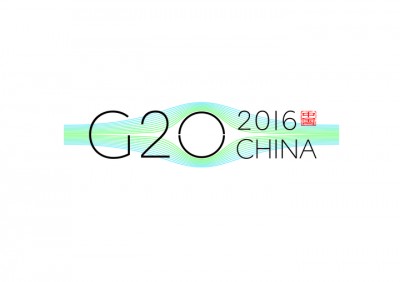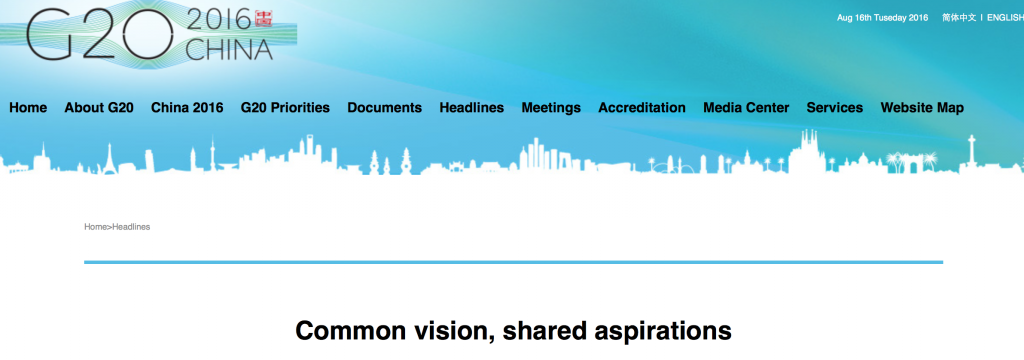China Hosts G20 Summit: Innovation, Structural Reform, “Towards an Inclusive World Economy”

China’s Presidency of the G20 culminates next month with the Hangzhou Summit, a gathering of world leaders and an extraordinary opportunity to steer the world economy toward a more equitable, stable and productive architecture which achieves the goal of “win-win” cooperation, long advocated by China, and ultimately benefiting both developed and developing countries alike. The theme of the Hangzhou Summit is: “Toward an innovative, Invigorated, Interconnected and Inclusive World Economy.”
During the April 21 Statement to the United Nations High-Level Thematic Debate on Achieving Sustainable Development Goals, China’s Vice-Minister of Foreign Affairs and G20 Sherpa, Li Baodong stated:
“The G20 embraces development as a source of strength and stands ready to work with developing countries to look for drivers of world economic growth. Development shall be in the genes of the G20 agenda…Development is everywhere, be it in the macroeconomic policy, international trade and investment, innovative growth and global economic governance. The G20 works for the benefit os not only its 20 member states, but the whole world. We will listen to more voices, pool more wisdom, and make even bigger contribution to common development of mankind and greater prosperity of the world.”
In a diplomatic and intriguing statement to the press, at the United Nations, also on April 21, G20 Sous-Sherpa Wang Xiaolong captured the enormity of the challenge confronting the G20 Summit, and the entire world, stating:
“Eight years after the financial crisis, the world economy still is weak and fragile; this is the slowest and weakest recovery process after a crisis, and one of the reasons is because the old modality of growth has largely run its course, and we need to find new drivers for the growth of the world economy. An important source of growth is innovation and the development of the developing countries.”
Wang Xiaolong’s statement encapsulates the current global economic crisis which has reached staggering and unsustainable proportions, the crisis of burgeoning inequality denounced and unredressed almost a half century ago at the United Nations Eleventh Special Session on Economic Development, when Joachim Chissano, then Foreign Minister of Mozambique deplored the fact that:
“The existing economic order is profoundly unjust…It runs counter to the basic interests of developing countries. We denounce any kind of economic prosperity or independence for part of mankind built on the dependence, domination and exploitation of the rest of mankind.”
The severity of this persistent injustice was again denounced, three decades later, at the United Nations General Assembly, on September 24, 2009 when Stjepan Mesic, then President of the Republic of Croatia stated:
“Our world is, finally, still dominated by an economic model which is self-evidently exhausted and has now reached a stage where it is itself generating crises, causing hardship to thousands and hundreds of thousands of people. If one attempts to save this already obsolete model at any cost, if one stubbornly defends a system based on greed and devoid of any social note worthy of mention, the result can be only one: social unrest harbouring the potential to erupt into social insurgence on a global scale.”
This relentless injustice of the current global economic architecture was directly confronted on April 21 by Li Baodong who stated:
“Inequality in the international system and governance mechanism is the biggest inequality of all…This year China has relaunched the G20 International Financial Architecture Working Group…held in-depth discussions on such issues as sovereign debt restructuring, global financial safety nets..We have also worked to promote inclusive finance and help to bring its benefit to developing countries and their vulnerable groups…As the biggest developing country, China knows full well that without the development of developing countries it would be impossible to invigorate the momentum of global development, tap into new and broader markets, or place the world economic recovery and growth on a solid footing. True development will not be achieved until the world economies grow in a coordinated manner, various industries realize inter-connected and win-win progress, and people in all walks of life enjoy shared prosperity.”
At the Hangzhou G20 Summit China will encourage resolution of both the symptoms and root causes of economic problems, which inevitably morph into social and political problems. China has courageously accepted and shouldered the Herculean task of persuading leaders and finance ministers of countries whose economies are based on outmoded and counterproductive zero-sum thinking of the imperative of change; and recognizes the necessity of transforming that rigid mind-set into acknowledgment and acceptance of the fact that win-win cooperation is now the only hope for humanity’s survival.
The G20 Hangzhou Summit is at the cross-roads of world history, and a supreme opportunity to encourage world leaders to focus, predominantly on the paramount importance of investment in equitable global development, eschewing destructive investment tendencies which may inevitably provoke antagonism, confrontation and annihilating war. It is impossible to ignore or minimize the fact that the G20 gathering of leaders of both developed and developing countries is taking place against a backdrop of countervailing and sometimes ominous tendencies.
China’s task is daunting, but throughout the last and present century, China has shown almost superhuman ability to overcome enormous and virtually insurmountable obstacles, as a result of powerful strategic thinking, great determination, and formidable intelligence. China’s success in restructuring its own economy and society, and ascending to global pre-eminence, is a basis for hope that their win-win approach to the new global economic architecture will prevail and gain acceptance by all participants in the G20 Summit.
Resurgence of the West’s Cold War Mentality
Among the challenges faced by China, as a nation is the resurgence of a cold-war mentality in sectors of some of the countries participating in the G20 Summit. Although this is a sensitive subject to raise, it would be tantamount to an ostrich hiding its head in the sand to omit the fact that despite fierce opposition by distinguished members of the US Congress, including Senator Diane Feinstein,and wiser leaders of the US Military, such as former Secretary of Defense, William Perry, the US is investing one trillion dollars in developing nuclear weapons in coming years.
“The diminished nuclear arms and nonnuclear weapons that Mr. Obama is developing could make the unthinkable more likely. They make the weapons seem more usable, even if there’s no credible plan for how you control escalation. “ (Perry)
Britain’s new Prime Minister Theresa May recently supported Britain’s investment of 51 billion dollars in development of new nuclear weapons, and Germany has now pledged to invest 148 billion dollars in military development.
These provocative military investments by economies which prioritize profit maximization to the exclusion of all other considerations could precipitate another arms race, and ultimately Armageddon, for it is not possible to ignore the fact that war is one of the most profitable “ïndustries” of all for the miniscule group of arms merchants.
Further, the US is investing an exorbitant sum of money in the Thaad missile system based in the Republic of Korea, despite enraged domestic protest within the Republic of Korea against this provocative military expenditure, an increased militarization of the Korean peninsula which disrupts and destabilizes the geopolitical balance of North Asia, and constitutes a grave threat to the security of both China and Russia. The reach of the Thaad X Band is so wide (almost 2,000 kilometers) that it is disingenuous to allege, and to expect anyone to believe that the target is the DPRK.
Five percent of the world’s military budget could fund the entire United Nations 2030 Agenda, transforming the world into a virtual paradise, funding research to discover the cure for terminal diseases, providing healthy environments and living spaces for everyone on the planet, and eliminating many of the root-causes of the now global scourge of terrorism. One major war could obliterate all successful development efforts and accomplishments by the United Nations.
With China’s concentrated and compelling focus on development and win-win cooperation, it will be their Presidency’s ultimate triiumph to persuade the leaders of the G20 gathered in Hangzhou that investment in global development and human capital is a wiser and more lucrative long-term use of their resources than recklessly and mindlessly squandering trillions of dollars on life-destroying weapons, the result of which is inevitably fatal for humanity. China’s victory at the G20 Summit in Hangzhou will be to persuade the participants of the entire conference that win-win cooperation is not only “the right thing to do, but it is the smart thing to do.


